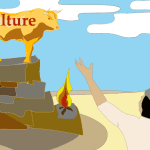This Sunday is the first Sunday in the traditional church season of Lent, the 40-day period of preparation for Easter. Though Lent is not mandated by Scripture, it is edifying for the church for a couple of reasons.
First, Lent cannot be separated from Easter. It is a journey toward Easter, a 40-day preparation for a feast. Easter, with its celebration of the resurrection of Jesus, is also a celebration of our participation in Easter, in resurrection and new life. This has been symbolized historically by the practice, in some places, of reserving baptisms for Easter, and using Lent as a preparation not only for Pascha but for baptism. This is not a wise practice, but the theological logic behind it make sense: We have been baptized into the new life of the kingdom, but we are frequently forgetful of the life we have in Jesus and need to be restored. Lent has been part of the church?s assistance in keeping us focused on the life we have in Jesus. Each year, we are given 40 days to refocus on the resurrection, to purge out the old leaven of hypocrisy, sloth, and nominalism, and to renew our baptisms.
Second, Lent is a period of fasting. Fasting in Scripture is not for the purpose of ascetic self-disciple. Fasting is associated with periods of penance, and there is an affliction of soul in fasting (Lev 16), a reminder of our sinfulness. Yet, we don?t fast because food is bad or the body is bad. We fast as a way of preparing for the feast to come, of making the way clear for a festival renewal. Fasting is also a means of reminding ourselves that we do not live by bread alone, but by the word and Spirit of God. Lenten fasting shows us that our life is in the Risen Son, and not in the bread and meat that we eat. Fasting is part of the baptismal renewal that is at the heart of Lent.
Here are a few suggestions for Lenten practices. First, don’t try to be Supersaint with the fasting. If you wish to fast, start slow and do it one day a week, fasting from a single meal rather than through the whole day. Second, during the time that you would be eating the meal, meditate on various passages of Scripture that describe the new life we have in the resurrection of Jesus — such as Matthew 5; Romans 6:1-14; 1 Corinthians 6:9-20; Galatians 5:16-24; Ephesians 4:17—5:2; 5:15-33; Colossians 3:12-17; and so on. Any passage that lists Christian virtues and fruits would be useful. Ask God to expose times when you’ve sinned in those areas, to forgive you for those sins, and to work in you by His Spirit to produce the fruits of resurrection life. Use Lent to systematically “put off” the deeds of the flesh, so that you can enter into Easter by “putting on” the fruits of the Spirit.















